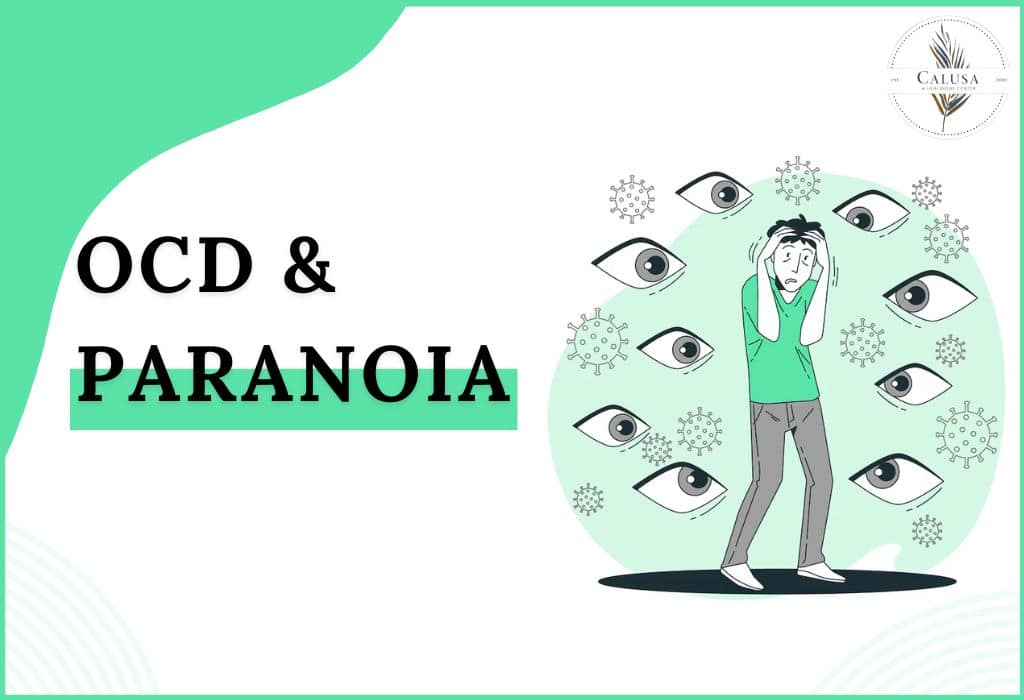Obsessive compulsive disorder & Paranoia is a mental health condition that can significantly impact a person’s life. It’s characterized by a relentless cycle of intrusive thoughts (obsessions) that trigger repetitive behaviors aimed at reducing anxiety. Imagine being bombarded by unwanted thoughts that feel impossible to ignore, leading you to perform rituals just to feel a temporary sense of calm. That’s the reality for millions of people worldwide struggling with obsessive-compulsive Paranoia.
Understanding the connection between OCD & Paranoia is crucial, not only for those directly affected but also for those who care for them. By shedding light on its symptoms and prevalence, we can break down the stigma surrounding OCD & Paranoia and empower individuals to seek the help they deserve. The following sections will delve deeper into the specific characteristics of obsessive-compulsive Paranoia, exploring its impact and potential connections with other conditions like paranoia.
Are repetitive thoughts and compulsions overwhelming your daily life?
Revealing the Grip of OCD & Paranoia
Obsessive-compulsive Paranoia isn’t just about being tidy or liking things a certain way. It’s a relentless cycle fueled by intrusive thoughts and repetitive behaviors that can significantly disrupt daily life. Let’s look deeper into the hallmarks of OCD: obsessions and compulsions.
Obsessions, Unwanted Guests in the Mind
- Definition and Characteristics: Obsessions are persistent, intrusive thoughts, images, or urges that feel difficult to control. They often center around specific themes, causing significant anxiety and distress. People with OCD recognize these thoughts as irrational, yet they struggle to silence them.
- Common Types of Obsessions: While obsessive-compulsive Paranoia can manifest in unique ways, some common themes of obsessions include:
- Contamination: Fear of germs, dirt, or illness leading to excessive washing or cleaning rituals.
- Symmetry and Order: A constant need to arrange things specifically, causing distress if disrupted.
- Harm: Intrusive thoughts of harming oneself or others, leading to compulsions aimed at preventing these perceived dangers.
- Morality: Excessive focus on right and wrong, leading to guilt, doubt, and repetitive confessionals.
Seeking Relief Through Repetitive Behaviors
Compulsions are repetitive behaviors or mental acts that individuals feel driven to perform in response to their obsessions. These behaviors are aimed at reducing anxiety, even though they may not be logically connected to obsessive thoughts. While completing the compulsion might bring temporary relief, the cycle often starts anew when the obsessions return.
Common Types of Compulsions
Just like obsessions, compulsions can vary, but some common examples include
- Washing: Excessive handwashing, showering, or cleaning rituals often exceed hygiene needs.
- Checking: Repeatedly checking doors, locks, appliances, or other objects to ensure they are secure or off.
- Counting: Counting objects repeatedly in a specific order or mentally repeating phrases to feel a sense of control.
- Ordering and Arranging: Constantly arranging objects in a specific way to achieve a sense of order and symmetry.
The Shadow OCD & Paranoia Casts on Daily Life
The relentless cycle of obsessions and compulsions can significantly disrupt daily functioning. Here’s how OCD Paranoia can together impact an individual’s life:
Interference with Work, School, and Relationships
Obsessing and executing compulsions can make it difficult to focus on work or school tasks. Social interactions can also be strained due to fears of contamination or the need to perform rituals in public.
Emotional Distress and Anxiety
The constant battle against intrusive thoughts and the pressure to perform compulsions can lead to significant anxiety, depression, and feelings of shame.
Understanding these core symptoms of obsessive-compulsive Paranoia is crucial for both individuals struggling with the condition and those who support them. The following section will explore the potential connection between OCD and paranoia, highlighting how these seemingly distinct conditions can sometimes become entangled.
Unveiling the Roots of OCD
The exact cause of OCD remains a mystery, but researchers believe it’s likely a complex interplay of several factors:
Genetic Factors
- Family History and Heritability: Studies suggest having a close relative with OCD increases the risk of developing the condition. This points towards a potential genetic predisposition.
- Neurobiological Underpinnings: Research suggests abnormalities in certain brain chemicals, like serotonin, might play a role in OCD. Serotonin is a neurotransmitter involved in mood regulation, and imbalances may contribute to intrusive thoughts and compulsions.
Environmental Factors
- Traumatic Experiences and Stressors: Childhood trauma, abuse, or neglect can increase the risk of OCD. Stressful life events can also trigger the onset of OCD or worsen existing symptoms.
- Learned Behaviors and Reinforcement: In some cases, OCD behaviors might develop through classical conditioning. For example, if washing hands temporarily relieves anxiety after exposure to dirt, the behavior may be repeated and reinforced over time.
Neurological and Cognitive Factors
- Dysregulation in Brain Circuitry: Researchers believe a brain circuit called the cortico-striato-thalamo-cortical loop might be involved in OCD. Disruptions in this circuit’s function could contribute to repetitive thoughts and behaviors.
- Cognitive Biases and Thought Patterns: Individuals with OCD may have certain cognitive biases that make them more susceptible to intrusive thoughts. For example, placing excessive importance on order, symmetry, or threat perception can fuel the obsessive-compulsive cycle.
It’s important to remember that OCD likely arises from a combination of these factors. Understanding the potential causes can help us develop more effective treatment strategies and provide support for individuals struggling with this condition. The following section will explore a surprising connection – how OCD and paranoia can sometimes become entangled.
Factors that Increase OCD Vulnerability
While the exact cause of OCD & Paranoia remains elusive, several factors can increase an individual’s susceptibility:
Age of Onset
Obsessive-compulsive Paranoia can develop at any point in life, but the typical onset is during childhood or adolescence. Early intervention is crucial for managing symptoms and preventing long-term complications.
Gender Differences
OCD & Paranoia affects both men and women, although research suggests slight variations. Studies indicate females might be more prone to contamination-related obsessions and compulsions, while males might experience higher rates of aggressive or intrusive thoughts.
Co-occurring Mental Health Conditions
Individuals with OCD & Paranoia often have co-occurring mental health conditions like anxiety disorders or depression. The presence of these conditions can complicate the diagnosis and treatment of obsessive compulsive Paranoia.
Personality Traits
Certain personality traits might make individuals more vulnerable to developing OCD. These include:
- Perfectionism: A relentless pursuit of flawlessness and a high need for order can fuel the obsessive need for control and symmetry often seen in OCD.
- Neuroticism: A tendency towards negative emotions, worry, and rumination can exacerbate the anxiety associated with intrusive thoughts in OCD.
Understanding these risk factors can help identify individuals who might be more susceptible to OCD and allow for earlier intervention. However, it’s important to remember that these factors don’t guarantee the development of OCD. The next section will explore a fascinating phenomenon – the potential connection between OCD and paranoia.
Your Journey to a Brighter Tomorrow
FAQs
What is OCD its symptoms and its causes?
Obsessive-compulsive disorder (OCD) manifests as persistent, uncontrollable thoughts (obsessions) and repetitive actions (compulsions). These symptoms endure over time, often consuming significant portions of a person’s day and leading to distress or disruption in daily functioning.
What are the 5 causes of OCD?
The precise cause of OCD remains uncertain, although factors such as family history, psychological tendencies, environmental influences, and individual biology are believed to contribute. Certain personality traits, such as perfectionism, may increase susceptibility to OCD. Additionally, experiences of psychological trauma or significant life stressors might also influence its development.
What are the biological causes of OCD?
Biological models propose that OCD may be linked to dysfunction within a neural circuit extending from the orbital frontal cortex to the cingulate gyrus, striatum (including the caudate nucleus and putamen), globus pallidus, thalamus, and returning to the frontal cortex. Various researchers have contributed to this hypothesis.
What diseases can cause OCD?
Infections such as strep, influenza, mycoplasma pneumonia, Lyme disease, herpes virus, mononucleosis, and Coxsackie virus have been identified as potential triggers. In some cases, the body’s immune system may mount an autoimmune response targeting the basal ganglia, leading to brain inflammation and the emergence of neuropsychiatric symptoms, which may include behaviors resembling OCD.
It is possible to overcome OCD and live a fulfilling life
Obsessive-compulsive disorder (OCD) is a complex condition that can significantly impact a person’s life. By understanding the core symptoms – intrusive thoughts (obsessions) and repetitive behaviors (compulsions) – and the potential risk factors, we can break down the stigma surrounding OCD and empower individuals to seek help.
The good news is that OCD is a treatable condition. With professional help, individuals can learn effective strategies to manage their obsessions and compulsions, reclaiming control of their lives. Cognitive Behavioral Therapy (CBT) and Exposure and Response Prevention (ERP) are two evidence-based treatments that can significantly reduce OCD symptoms.
If you suspect you or someone you know might be struggling with OCD, don’t hesitate to reach out to a mental health professional. Early intervention is crucial for managing symptoms and preventing long-term complications, contact Calusa.










